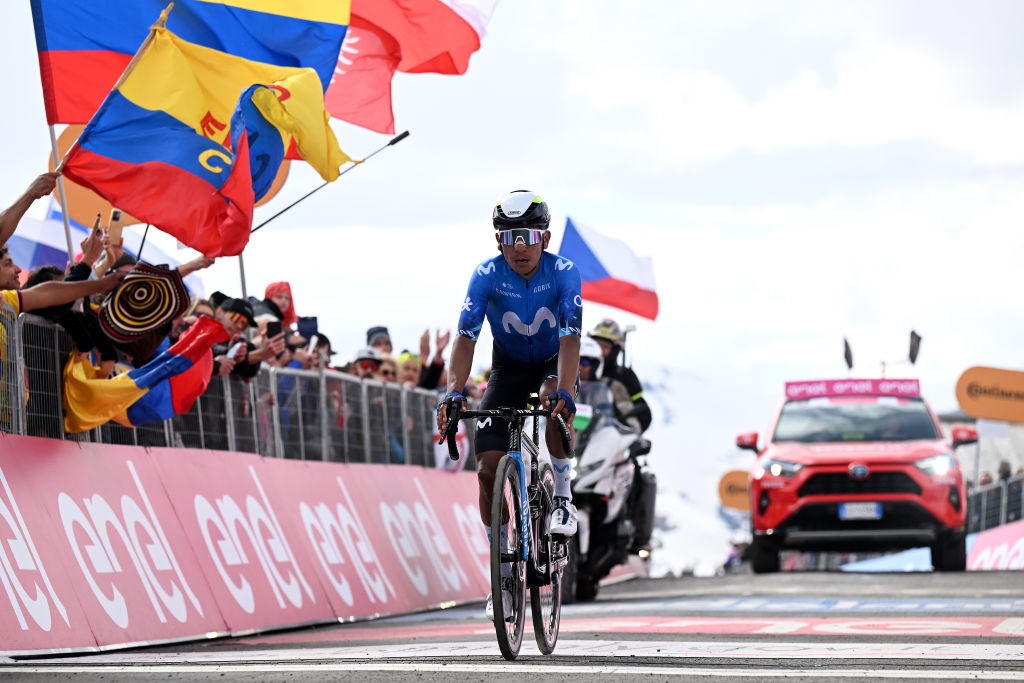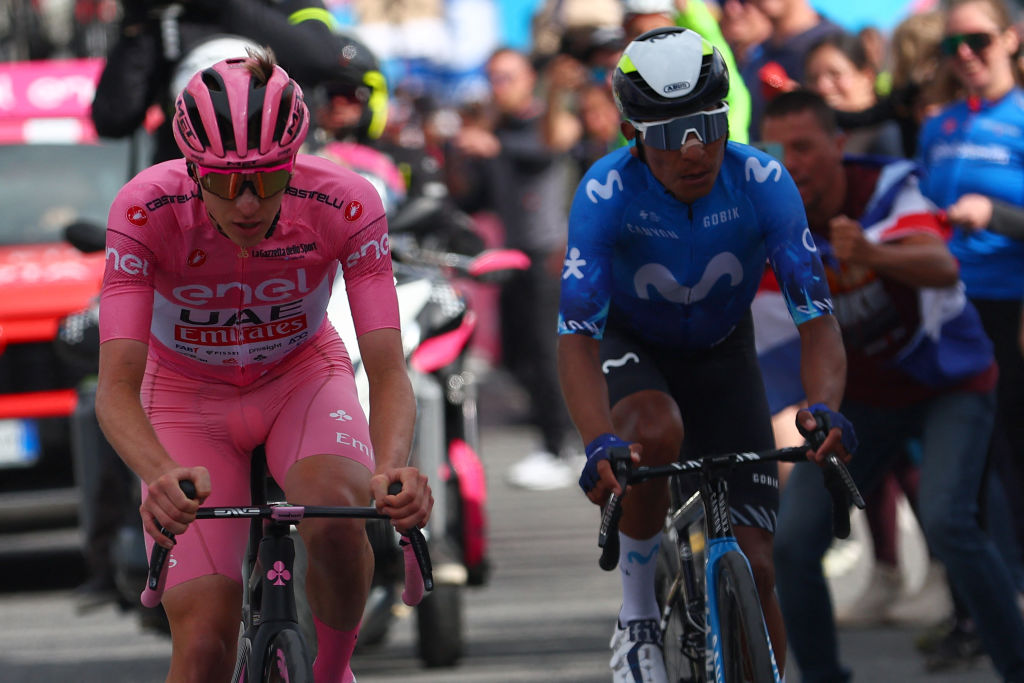'It's emotional' – Nairo Quintana denied comeback Giro d'Italia win by Tadej Pogačar
Colombian caught and passed by maglia rosa on the final ramps to Livigno

Nairo Quintana knew what was coming. Up ahead, the final ramps of the climb above Livigno to Mottolino stiffened to a cliff-like 19%. A little further down the mountain, Tadej Pogačar was closing in upon him at a prodigious rate of knots.
The chances of Quintana making it safely ashore before Pogačar washed past him were so slim as to be non-existent, but he stuck to his course as best he could in the closing kilometres of stage 15 of the Giro d’Italia.
A member of the day’s sizeable early break, Quintana had attacked on the Passo di Foscagno with 20km or so remaining, catching and passing fellow escapee Georg Steinhouser near the top of the climb. By then, however, word had filtered through that Pogačar had struck out alone from the group of favourites. There was a grim inevitability about proceedings from there.
Quintana still had 40 seconds in hand by the time he hit the final 4km ascent to the line, but far sturdier flood defences are required against this iteration of Pogačar. The Colombian began to leak time on the lower slopes, and he was swept away just as the gradient bit inside the final 2km.
While Pogačar bounded up the final slopes to place another hefty deposit on the Trofeo Senza Fine, the man who won this race ten years ago did enough to hold on for second place. Quintana rolled across the line 29 seconds behind Pogačar, blessing himself as he did so. It was his best result since he was disqualified from the 2022 Tour de France after testing positive for Tramadol on two occasions.
When Quintana wheeled to a halt beyond the finish line, he propped himself against a barrier while a Movistar soigneur helped him into a jacket. He leant over the handlebars and buried his face in a towel for a moment. By the time he looked up, a scrum of microphones and cameras had built up around him. He nodded for the post-mortem to begin.
“Que valiente, Nairo,” was the opening gambit from Colombian television. A statement rather than a question – “How courageous you were, Nairo” – but amid the tumult of a Giro finish line on a narrow road 2,385m above sea level, it made no difference. At this point, every query is essentially a variation on “what was going on out there?”
Get The Leadout Newsletter
The latest race content, interviews, features, reviews and expert buying guides, direct to your inbox!
“It was a stage that I liked, with a lot of altitude gain,” Quintana said. “It’s been a big effort since the first day of the Giro, I was hoping to feel better coming in here. All of this year has been difficult. But we’re here.
“It’s emotional, what can I say. It’s emotional. It’s a shame not to have finished first, but Pogačar was very strong, very solid, like we know. He said he was going to try for the stage and that’s what he did. The important thing was that we tried, we worked very well as a team. And now let’s hope we can continue in the same way.”
When Quintana and the escapees his the Passo di Foscagno still armed with more than three minutes on the maglia rosa group, it briefly looked as though Pogačar might have left it too late to claim the tappone of the Giro. In the final reckoning, however, his superiority brooked no argument.
The altitude and the gradient might have been in Quintana’s favour, but all the momentum was with the younger man stalking him up the mountain. Quintana put up as much resistance as he could, but Pogačar, who put almost three minutes into his GC rivals, was not going to be denied.
“The tactic for the last ramps was just accelerate, accelerate,” Quintana said. “I knew those ramps were very difficult, but I just gave my all. In the end, I had to had to go up quite steady.”
Movistar

Quintana’s career had looked to be over in the winter of 2022, when he parted company with Arkéa-Samsic in the wake of his positive tests for Tramadol and failed to find a new contract elsewhere. After spending the 2023 season on the sidelines, however, Quintana was thrown an unexpected lifeline by his old team Movistar last autumn.
There was something of a quid pro quo about the move. Quintana was in desperate need of a team to resuscitate his career, and Movistar, struggling for traction in the post-Valverde era, were able to add a marketable, sponsor-pleasing star. Quintana’s second act at Movistar had been a troubled one, however. He contracted COVID-19 at the Tour Colombia in February and then crashed out of the Volta a Catalunya in March.
After initially targeting the GC at the Giro, Quintana’s ambitions for this race were downgraded to hunting a stage win. He fell short of that goal on Sunday, but in the context of the last few years, he couldn’t couch his second place as a defeat.
“It tastes very nice,” Quintana said. “I want to thank my team for giving me these opportunities, for being my team, and for bringing me home.”
Quintana came home last winter, but he knows he can’t turn the clock back all the way. He is no longer the rider who won the Giro d’Italia ten years ago. The point was highlighted when Pogačar surged past and later hammered home in the maglia rosa’s press conference, when he remembered watching Quintana’s battles with Chris Froome a decade or so ago.
“I was always upset with Nairo for not attacking earlier and trying to break Froome from further out,” Pogačar said. “He was always waiting for the last 3k or something.”
In the Alps on Sunday, Quintana went from distance, like a young Pogačar would have demanded, but the new reality overtook him. Nothing to be done. “He’s very strong, very solid,” Quintana said of Pogačar. “He can win whatever he wants.”
Get unlimited access to all of our coverage of the Giro d'Italia- including journalists reporting, breaking news and analysis on the ground from every stage of the race as it happens and more. Find out more.

Barry Ryan was Head of Features at Cyclingnews. He has covered professional cycling since 2010, reporting from the Tour de France, Giro d’Italia and events from Argentina to Japan. His writing has appeared in The Independent, Procycling and Cycling Plus. He is the author of The Ascent: Sean Kelly, Stephen Roche and the Rise of Irish Cycling’s Golden Generation, published by Gill Books.